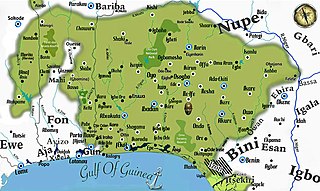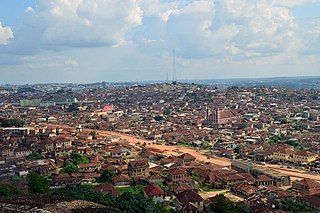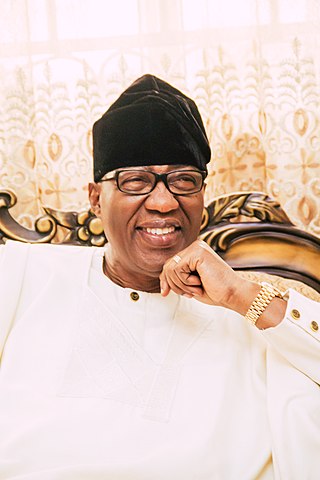Related Research Articles

The Catholic Church in Nigeria is part of the worldwide Catholic Church, under the spiritual leadership of the Pope, the curia in Rome, and the Catholic Bishops' Conference of Nigeria (CBCN).

Enugu is the capital city of Enugu State in Nigeria. It is located inland in the Southeastern part of Nigeria. According to the 2006 census, the city had a population of 820,000.

Yorubaland is the homeland and cultural region of the Yoruba people in West Africa. It spans the modern-day countries of Nigeria, Togo and Benin, and covers a total land area of 142,114 km2 (54,871 sq mi). Of this land area, 106,016 km2 (74.6%) lies within Nigeria, 18.9% in Benin, and the remaining 6.5% is in Togo. Prior to European colonization, a portion of this area was known as Yoruba country. The geo-cultural space contains an estimated 55 million people, the majority of this population being ethnic Yoruba.

Ogun State is a state in southwestern Nigeria. As a Nigerian state, Ogun is the second most industrialised state after Lagos, with a focus on metal processing. It has good road and rail connections to the harbours in Lagos and Lekki. Wole Soyinka, winner of the Nobel Prize for Literature 1986, lives in Ogun.
Anarchism in Nigeria has its roots in the organization of various stateless societies that inhabited pre-colonial Nigeria, particularly among the Igbo people. After the British colonization of Nigeria, revolutionary syndicalism became a key factor in the anti-colonial resistance, although the trade union movement deradicalized and took a more reformist approach following the country's independence. The contemporary Nigerian anarchist movement finally emerged from the left-wing opposition to the military dictatorship in the late 1980s and saw the creation of the Awareness League.

Osun State, occasionally known as the State of Osun by the state government, is a state in southwestern Nigeria; bounded to the east by Ekiti and Ondo states for 84 km and for 78 km respectively, to the north by Kwara State for 73 km, to the south by Ogun State for 84 km and to the west by Oyo State, mostly across the River Osun. Named for the River Osun—a vital river which flows through the state—the state was formed from the southeast of Oyo State on 27 August 1991 and has its capital as the city of Osogbo.

Chimaroke Nnamani is a Nigerian medical doctor and politician from Enugu State. He was elected Governor of Enugu State in the 1999 Enugu State gubernatorial election from 1999 to 2007. He subsequently served as a Peoples Democratic Party (PDP) Senator for Enugu East Senatorial District from 2007 to 2011 and was re-elected in 2019.

Gbenga Daniel is a Nigerian politician who served as Senator for Ogun East since 2023. He previously served as governor of Ogun State from 2003 to 2011.

Nigeria has 774 local government areas (LGAs), each administered by a local government council consisting of a chairman, who is the chief executive, and other elected members, who are referred to as councillors. Each LGA is further subdivided into a minimum of ten and a maximum of twenty wards. A ward is administered by a councillor, who reports directly to the LGA chairman. The councillors fall under the legislative arm of the Local Government, the third tier of government in Nigeria, below the state governments and the federal government.
The Ìgbómìnà are a subgroup of the Yoruba ethnic group, which originates from the north central and southwest Nigeria. They speak a dialect called Ìgbómìnà or Igbonna, classified among the Central Yoruba of the three major Yoruba dialectical areas. The Ìgbómìnà spread across what is now southern Kwara State and northern Osun State. Peripheral areas of the dialectical region have some similarities to the adjoining Ekiti, Ijesha and Oyo dialects.
The Anioma people are a West African people and a predominantly Igbo ethnolingustic group indigenous to present day Delta State, Nigeria. The Anioma people encompass and are native to the nine northereastern Local Government Areas of Delta State. Politically, the Anioma occupy the Delta North Senatorial District where they are the majority group.

Florence Nwanzuruahu Nkiru Nwapa, was a Nigerian author who has been called the mother of modern African Literature. She was the forerunner to a generation of African women writers, and the first African woman novelist to be published in the English language in Britain. She achieved international recognition with her first novel Efuru, published in 1966 by Heinemann Educational Books. While never considering herself a feminist, she was best known for recreating life and traditions from an Igbo woman's viewpoint.
Chike C. Aniakor is a Nigerian artist, art historian, author, and poet whose work addresses philosophical, political, and religious themes relating to Igbo society and the Nigerian Civil War. His artworks are held in major metropolitan museums including the Smithsonian Institution, Nigerian National Gallery of Art, and the Museum fur Volkerkunde in Frankfurt. Aniakor is a prolific writer and has authored over 75 books and articles.
Christopher Uchefuna Okeke, also known as Uche Okeke, was an illustrator, painter, sculptor, and teacher. He was an art and aesthetic theorist, seminal to Nigerian modernism.

Frank Nnaemeka Nweke Jr is a Nigerian Politician, Entrepreneur, Teacher and Social Innovator. He is a two-time Federal Minister in Nigeria and former Director General, Nigerian Economic Summit Group (NESG). He is currently a member of the All Progressives Grand Alliance (APGA) and vied for the position of Governor of Enugu in the 2023 Nigerian General Election, upon emerging the party candidate at the primary election in May 2022.
Ipetu-Ijesa, also called Ipetu-Aro Odo among its inhabitants, is a town in Oriade local government area, Osun State, Nigeria. It is located in the western part of Nigeria, about 40 km from Ile-Ife and 37 km from Akure. The people are of the Yoruba ethnic group, and the title of the traditional king of Ipetu-Ijesa is Ajalaye of Ipetu-Ijesa.

Nigerian nationalism asserts that Nigerians as a nation should promote the cultural unity of Nigerians. Nigerian nationalism is territorial nationalism and emphasizes a cultural connection of the people to the land, particularly the Niger and the Benue Rivers. It first emerged in the 1920s under the influence of Herbert Macaulay, who is considered to be the founder of Nigerian nationalism. It was founded because of the belief in the necessity for the people living in the British colony of Nigeria of multiple backgrounds to unite as one people to be able to resist colonialism. The people of Nigeria came together as they recognized the discrepancies of British policy. "The problem of ethnic nationalism in Nigeria came with the advent of colonialism. This happened when disparate, autonomous, heterogeneous and sub-national groups were merged to form a nation. Again, the colonialists created structural imbalances within the nation in terms of socio-economic projects, social development and establishment of administrative centres. This imbalance deepened the antipathies between the various ethnic nationalities in Nigeria ." The Nigerian nationalists' goal of achieving an independent sovereign state of Nigeria was achieved in 1960 when Nigeria declared its independence and British colonial rule ended. Nigeria's government has sought to unify the various peoples and regions of Nigeria since the country's independence in 1960.

The Ekiti people are one of the largest historical subgroups of the larger Yoruba people of West Africa, located in Nigeria. They are classified as a Central Yoruba group, alongside the Ijesha, Igbomina, Yagba and Ifes. Ekiti State is populated exclusively by Ekiti people; however, it is but a segment of the historic territorial domain of Ekiti-speaking groups, which historically included towns in Ondo State such as Akure, Ilara-Mokin, Ijare, and Igbara-oke. Ogbagi, Irun, Ese, Oyin, Igasi, Afin and Eriti in the Akoko region, as well as some towns in Kwara State, are also culturally Ekiti, although belong in other states today.
The Public Works Department of Nigeria also known as P.W.D. was the agency of the colonial government responsible for building and maintaining government buildings and property, roads, rail tracks, bridges, harbours and aerodromes. Its first director was appointed in 1896, in the preceding years, the department was under the guidance of the Surveyor-General.
References
- Two Nigerian Lists. African Affairs Vol. 44, No. 177 1945